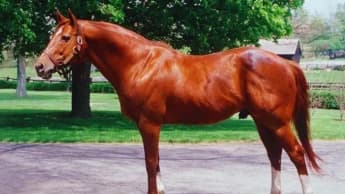The Unmatched Legend of Man o' War

Man o' War, an iconic figure in horse racing, showcased extraordinary speed and resilience during his remarkable career, leaving a lasting legacy that inspires racing enthusiasts today.
Man o' War, born on March 29, 1917, at Faraway Farm in Lexington, Kentucky, is often considered one of the finest racehorses to ever step onto a racetrack. His beautiful chestnut coat and distinctive white star on his forehead made him easily recognizable. Guided by the renowned trainer Louis Feustel and expertly ridden by jockey Johnny Loftus, Man o' War enchanted racing enthusiasts worldwide. His career lasted just over two years, during which he became a legend, celebrated for his speed, stamina, and seemingly invincible performance on the track. His extraordinary achievements went beyond his personal records, significantly shaping the future of horse racing.
Significant Achievements in Career
In 1919, Man o' War kicked off his racing career with a spectacular victory in his first race at Belmont Park in June. He started strong, found his pace, and effortlessly sailed to triumph, finishing the race six lengths ahead of the other horses.
1919-1920: The initial phase of his career was characterized by a string of commanding victories, with numerous wins achieved by substantial margins. His remarkable ability to dominate his competitors became a defining feature of his career, earning him the respect and admiration of both fans and racing professionals.
In 1920, Man o’ War's career saw a remarkable surge with his victory in the esteemed Belmont Stakes. This performance was nothing short of legendary, as he triumphed over his competitors by an incredible 20 lengths, marking one of the most dominant wins in the history of the race.
In 1920, Man o' War achieved another remarkable victory in the Preakness Stakes, triumphing by a significant margin. His impressive performance in these Triple Crown races further enhanced his rising popularity.
1919-1920: Among his other significant victories during this period were the Dwyer Stakes, Lawrence Realization Stakes, Travers Stakes, and the Kenilworth Park Gold Cup, to name a few. Each of these successes solidified his status as a racing legend, and he became recognized as a horse capable of accomplishing the seemingly unattainable.
1919-1920: Despite his remarkable success, Man o' War experienced his sole defeat in the Sanford Memorial Stakes of 1919. In this race, where he was the clear favorite, he was surprisingly bested by a horse named Upset, who crossed the finish line ahead of him. This unexpected loss stunned the racing community, as it was almost inconceivable for Man o' War to be defeated.
1920: Following his loss, Man o’ War made a remarkable comeback, securing the Kenilworth Park Gold Cup along with several other victories, which further established his supremacy on the racetrack.
Retirement: Following his achievements in 1920, Man o' War transitioned to stud at the age of three, concluding his racing career with an impressive record of 20 victories out of 21 races. Nonetheless, his influence as a racehorse would persist through his offspring, who would carry on his exceptional bloodline for generations to come.
Performance Metrics
|
Statistic |
Details |
|
Career Record |
21 starts, 20 wins, 1 second |
|
Total Earnings |
$249,465 (equivalent to approximately $3.5 million today) |
|
Major Races Won |
Belmont Stakes (1920), Preakness Stakes (1920), Dwyer Stakes (1919), Travers Stakes (1919), Lawrence Realization Stakes (1919) |
|
Notable Loss |
Sanford Memorial Stakes (1919) - defeated by Upset |
|
Winning Margins |
Frequently won by large margins, including a 20-length victory in the Belmont Stakes |
|
Racing Speed |
Maximum speed of 43.1 miles per hour |
Resilience & Comebacks
Man o' War's singular defeat, which resulted in a second-place finish at the Sanford Memorial Stakes, emerged as a pivotal moment in his career. This significance stemmed not merely from the loss but rather from his reaction to it. Despite the surprise of being beaten by a horse deemed less capable, Man o' War demonstrated remarkable resilience in his comeback. The defeat could be attributed to several factors, including that Man o' War was still developing toward his full potential, as well as the fact that it was one of the few occasions he faced formidable competition from another horse performing exceptionally well.
True champions are characterized by their capacity to bounce back from setbacks. Following his unexpected loss, Man o’ War embarked on an unprecedented winning streak, overwhelming his competitors in the races that followed. This comeback was not merely a personal victory; it demonstrated to the racing community that even the most formidable champions can be defeated, yet they can return even more powerful than before.
The resilience shown by Man o’ War on the racetrack contributed significantly to his reputation as a horse whose character was as exceptional as his abilities. He possessed a remarkable capacity to bounce back from difficulties and sustain his dominance, which garnered him admiration from both his fans and fellow competitors.
Heritage
The impact of Man o' War reaches far beyond his time on the racetrack. He set the benchmark for all subsequent thoroughbreds. His remarkable achievements have shaped nearly every significant racing program, especially in terms of breeding practices. The lineage of Man o' War has produced some of the most celebrated horses in the history of racing, ensuring that his legacy endures well into the future.
In 1957, Man o' War was honored with induction into the National Museum of Racing and Hall of Fame, recognizing his significant contributions to the sport of horse racing. His legacy was further cemented by his son, War Admiral, who achieved the prestigious Triple Crown in 1937, underscoring Man o' War’s role as a foundational figure in racing history.
The extraordinary blend of speed, power, and determination displayed by Man o’ War has motivated numerous horses and racing fans alike. His influence extended beyond his victories; he transformed the perception of the sport itself. His overwhelming prowess on the racetrack turned horse racing into a more thrilling and respected event.
Moreover, Man o’ War’s status as one of the most iconic horses in history has guaranteed that his name is forever associated with excellence in the sport of kings.
Future Perspectives
Even though Man o’ War passed away in 1947, his legacy continues to be a source of inspiration. His descendants have made a significant impact on the horse racing industry, and his lineage is a vital part of contemporary thoroughbred breeding. As the world of racing moves forward, it is evident that the remarkable accomplishments of Man o’ War will not be forgotten. His legacy can be observed in the horses that continue to break records and create history today, as well as in the breeding initiatives that are built upon his exceptional genetic heritage.
While it is improbable that any horse will match his extraordinary achievements precisely, the name Man o' War will always be associated with greatness. As future generations of racing enthusiasts and professionals look back on the sport's history, Man o' War's legacy will serve as a benchmark for excellence, and his influence will undoubtedly continue to impact the world of horse racing for many years ahead.






